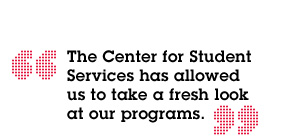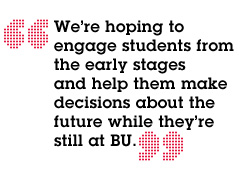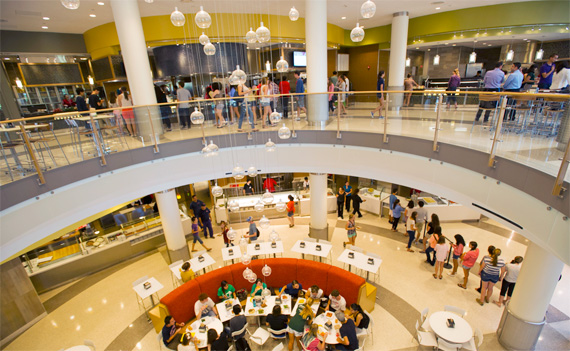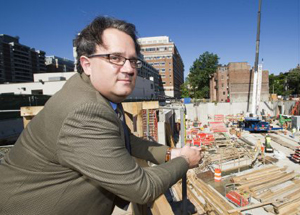Tagged: study skills
Center Brings Student Services Together
The Center for Student Services unites support and resource programs—and serves up fancy mac and cheese.
By Jessica Ullian
Photos by Kalman Zabarsky and Cydney Scott
Warning: students at BU may be suffering from culture shock this fall. When they left campus last spring or after a summer orientation, 100 Bay State Road was a construction site near Kenmore Square. When classes started in September 2012, however, the brand-new Center for Student Services was open for business, redefining the east entrance to Boston University and radically transforming dining, academic support, and career planning offerings on campus.
The six-story building includes three dining locations and a central lounge, nicknamed The Ellipse, where students can congregate. It’s also the new home of the Center for Career Development, the Educational Resource Center, and several College of Arts & Sciences advising and academic support programs. These offices, previously scattered across campus, are taking advantage of their new location to revamp their student outreach and make 100 Bay State Road a destination for students across the University.

“The Center for Student Services has allowed us to take a fresh look at our programs, as well as present a fresh physical face,” says Laurie Pohl, vice president of enrollment and student affairs. “We wanted to be sure we were putting modern, state-of-the-art services into this modern, state-of-the-art building.”
By concentrating the programs in a new location, Pohl says, students seeking anything from a chemistry tutor to a résumé critique will find a one-stop shop for support. “The idea is to take a more holistic view of these services and functions to help students succeed,” she says. “We want them to come in with an appointment, and leave with a plan.”

A Good Start
Many members of the Class of 2016 have already visited, beginning their yearlong freshman composition requirement with seminars at the Writing Program, which offers introductory classes to first-years at eight of BU’s undergraduate schools, or taking FY101, the intro-to-college seminar offered by Student Programs & Leadership. The move has provided both programs with major physical upgrades—enhanced classrooms, private tutorial space, activity group meeting areas—but the new comforts are just part of the appeal. With advising and academic support services gathered under one roof, there’s unprecedented opportunity for undergraduates to take advantage of all the resources available. Students dropping by for a writing class can get a firsthand look at peer mentorship or student government in action. Others coming to meet with an academic advisor can walk down the hall for help with a term paper.
“We’re really hoping to become a destination for students,” says Joseph Bizup, director of the Writing Program. “And we’re having a lot of conversations about how to leverage our services to deliver something that’s coherent, integrated, and good.”
Sustained Success
The focus goes far beyond freshmen, too: the Center for Career Development (CCD) and the Educational Resource Center (ERC) are putting their heads together to engage students at every stage of college life, and help them forge a path to the future. “Our strategic plan includes both centers, building on the idea that students mature academically, which leads to a maturation of their professional goals,” says Glenn Wrigley, director of the ERC, which provides services such as foreign language conversation groups and academic skills workshops.

The two centers are launching a joint student ambassador program, recruiting students to assist with community building and outreach, and training them to help with cover letters and provide résumé critiques, so they can deliver more student consultations, even at peak times of year. “We’re hoping to engage students from the early stages and help them make decisions about the future while they’re still at BU,” says Kimberly G. DelGizzo, CCD director.
Both centers share a high-profile promotional space on the first floor, intended to alert students to their main locations upstairs. The new offices also offer ample room for both centers’ needs: a tutorial room can become an interview room as needed, while study areas, with flat-screen monitors for laptops, are also used by campus recruiters leading information sessions for job-seeking students.
Fuel for Thought
If career planning and peer tutoring don’t get students in the door, Director of Dining Services Barbara Laverdiere has a secret weapon: prosciutto macaroni and cheese with an Asiago-sage crust.
The new dining options at 100 Bay State Road start with a bakery and café called Rize. There’s also Late Night Kitchen, where students can have what Laverdiere calls “comfort food with a twist,” like stuffed burgers or that mac and cheese. It’s a sit-down restaurant setup, but students can use their meal plan to purchase dinner.

Finally, there’s the two-story dining room, called the Fresh Food Company at Marciano Commons. A cross-campus sibling to the Fresh Food Company at West Campus, this dining hall seats 920 (and serves around 5,000 meals every day) and replaces the older dining halls at three nearby residences. The space has 12 dining stations for every meal, healthy menu options from BU Sargent Choice Nutrition Center, digital menu boards with nutrition information, and two kitchens dedicated to vegan and gluten-free meals to prevent cross-contamination.
“The new building has really given us a chance to do everything we’ve ever wanted,” says Laverdiere, who notes that the new kitchens feature energy-efficient appliances and advanced recycling and composting systems. “When students saw the space, they were blown away.”
Stumbling over Statistics?
At BU, there’s a resource center for students who are confounded by chemistry, hysterical over history, or otherwise in need of an academic assist.
By Mariana Ramirez Navarrete (COM’13)
It’s the night before your first final exam and maybe you haven’t started studying yet. You have a paper due, a lab report, and you still want to go to the gym, catch dinner with friends, and watch the latest episode of Glee. You’re stressed; you’re worried; and you don’t want to leave your room in the freezing weather.
We all know that life as a Terrier isn’t always easy, but we sometimes make it more difficult for ourselves with poor study habits and procrastination. Luckily, there are some professionals on campus who are more than happy to help students correct those mistakes and take some of the stress out of achieving academic success.
“Adults that you are,” Glenn Wrigley tells me, “you need to take responsibility for yourselves and find the help you need to succeed.”

Glenn Wrigley, director, overlooks the site of the new home of the Educational Resource Center at Boston University. Photo by Cydney Scott
Wrigley is the director of the Educational Resource Center at Boston University (ERC). A one-stop shop for students seeking to boost their grades, the ERC offers free tutoring, writing assistance, skill workshops, and other academic lifelines.
As a junior in the College of Communication, I’m embarrassed to admit that, while I was aware of the ERC’s existence, until recently I had not taken advantage of the tools it provides. Looking back now, I’m sure I could have made things much easier for myself if I had sought aid when I first felt the workload getting out of hand. Especially when I realized how much harder college really is than high school, and that my studying techniques had to change accordingly.
“Students often get to BU and they hit the ground running,” says Wrigley. “They’re not used to seeing C’s, and they feel comfortable with their studying methods. It’s not until after that first test or paper comes back that they look for help.”

The ERC is always ready with that help, offering a range of services, from individual tutoring sessions and writing labs, to foreign-language group talks and workshops in time management. There’s even a prep course to give students a head start on handling those dreaded organic chemistry assignments. And in addition to professional assistance, the ERC also features a peer-mentoring program, in which top-notch, faculty-recommended upperclassmen provide the individualized support many students need to succeed in a specific class or subject. Located on the fourth floor of the George Sherman Union, the ERC is every Terrier’s go-to resource when a class seems too much to handle.
Of course, the center’s staff can only point a student in the right direction. Wrigley says it’s critical that both parents and students know that in the end, each student is responsible for his or her own success: “Students need to get connected to faculty and administrators on campus. The quicker they can do that, the more likely they’ll be successful.”
Originally intended as a peer-mentoring center, the ERC has certainly evolved over its twenty-year history, adding services designed to aid students across their various academic endeavors. “The center soon took a prominent role among the student body,” said Wrigley. “We try very hard to get our message across to students, especially new students.”
Along with stressing the importance of personal responsibility, Wrigley maintains that the role of parents in a college student’s academic life should be minimal. Parents should educate themselves about the resources available on campus, but the decision to utilize those tools has to be the student’s. “Never call and make an appointment for your student,” Wrigley says. “That’s not the kind of help they need.”
Parents can help, however, by encouraging their students to talk to the people at the ERC about their academic careers. “That way, they can’t use the ‘No one ever told me’ excuse,” Wrigley points out. Urge students to work with the center staff to design a strong and effective studying method. After all, it’s easy to feel overwhelmed when facing a full slate of rigorous courses, and the ERC can bolster students as they navigate their schedules of papers, presentations, take-home quizzes, and looming midterms and finals.
Whether it’s through assisting students in improving their writing styles and techniques, or by offering them the opportunity to sit in on a foreign-language conversation led by a native speaker, the ERC is sure to supply your child with targeted, practical help. The important step is walking through the center’s doors—that’s the way toward better academic performance. ■







